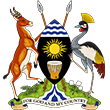![]()
Political Leadership

Yoweri Kaguta Museveni became President of the Republic of Uganda on January 29, 1986 after leading a successful five-year liberation struggle. He went to the bush with 26 other young men and organised the National Resistance Movement and National Resistance Army (NRM/NRA) to oppose the tyranny that previous regimes had unleashed upon the population.
The push for Kampala started on January 17th from different parts of the central region. Museveni was the overall commander. They captured power on 26th January, 1986.
After victory, he formed a broad-based government that helped unite the country's political groups. Prior to the struggle of 1981-1986, Museveni was one of the leaders in the anti-Amin resistance of 1971-1979 that led to the fall of the Amin regime.
Museveni, who has been politically active since his student days at Ntare School, Mbarara, in South West Uganda, studied political science at the University of Dar es Salaam, graduating in 1970 with a Bachelor of Arts degree in Economics and Political Science.
After Idi Amin's coup in 1971, Museveni was instrumental in forming FRONASA (the Front for National Salvation). Fronasa made up the core of one of the Ugandan fighting groups which, together with the Tanzanian People's Defence Forces, ousted Amin's regime in April 1979.
In the governments that succeeded Amin, Museveni served briefly as Minister of Defence, Minister of Regional Co-operation and Vice-Chairman of the Military Commission. In December 1980, the country's first general elections in 20 years were held but they were rigged by Milton Obote's Uganda People's Congress party. On February 6, 1981, he launched a guerrilla struggle. He went to the bush with only 26 guns and organised the National Resistance Army (NRA) to oppose the Obote regime for its undemocratic and tyranical actionas.
The NRA (now renamed the Uganda People's Defence Forces) is unique in Africa for being the only guerrilla force to take over power without much external support and without having a rear base in a neighbouring country. Its main camps were based only 20 miles from the capital, Kampala. This demonstrated how the NRA leadership was, in extremely difficult circumstances, capable of achieving sophisticated levels of organisational discipline and techniques for managing both soldiers and civilians.

